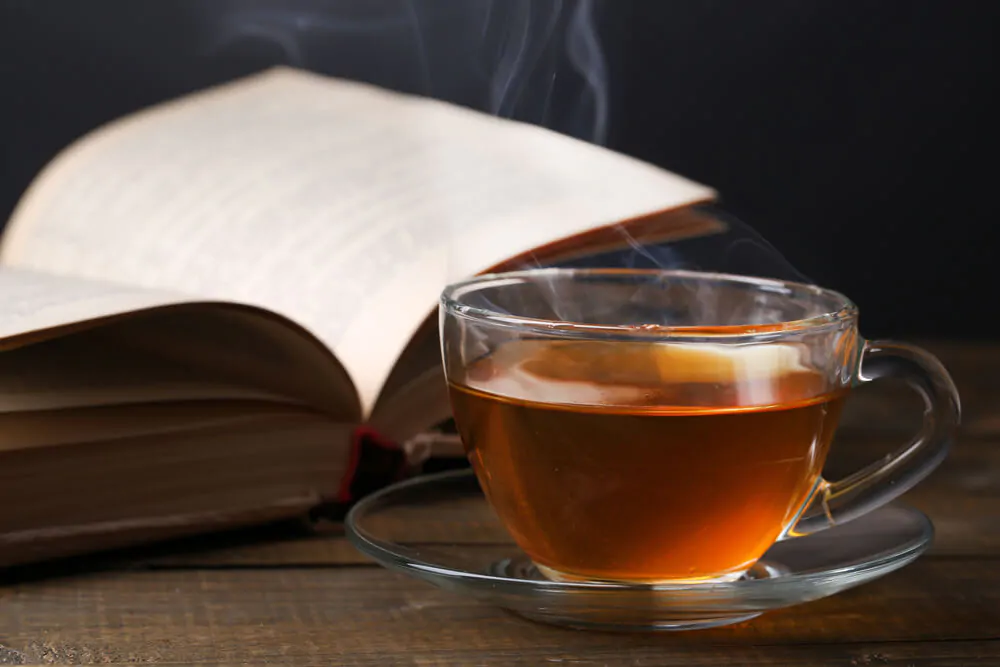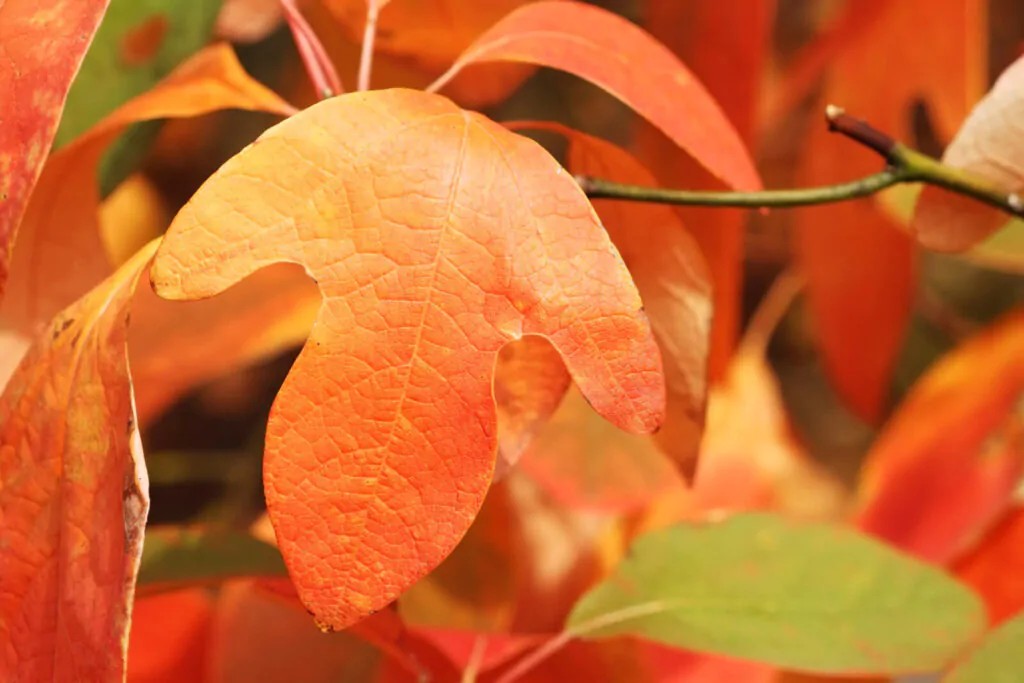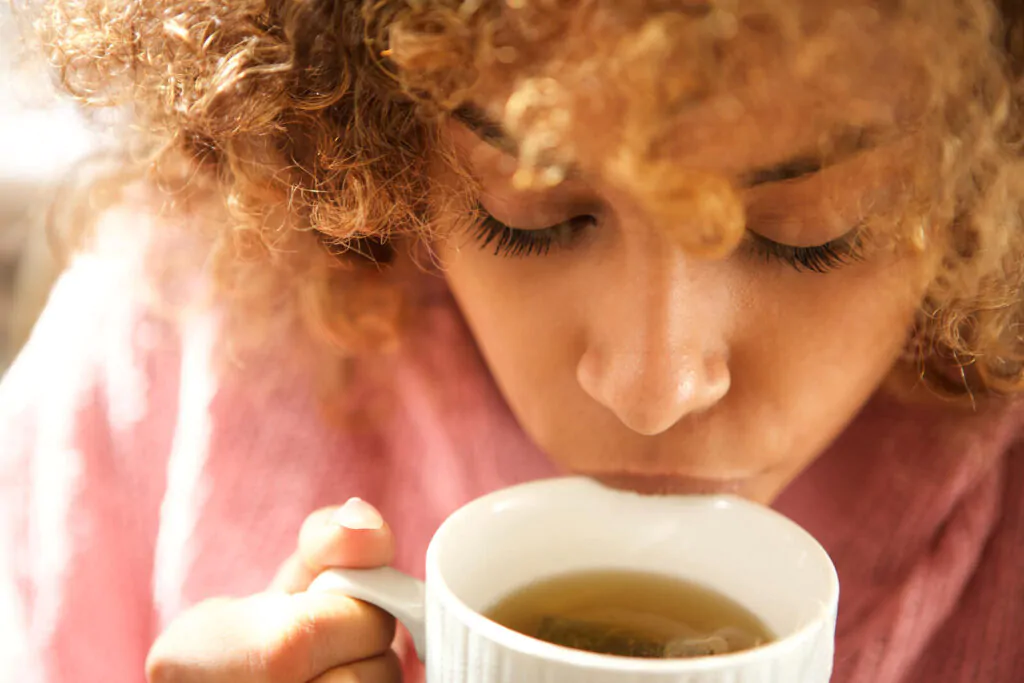What is sassafras tea? Sassafras tea is an aromatic tea that’s packed with flavor. It also has numerous health benefits, not to mention a rich history. Read on for more information.

The main ingredient in the soft beverage, root beer, was once the root from the Sassafras tree. So, if you ever smell Sassafras, it might trigger thoughts of that sweet and spicy scent of root beer.
Sassafras tea comes from harvesting the root and root bark of the Sassafras tree. The plant exists primarily in the East and South-East U.S. States of North America.
It is an aromatic plant, meaning it has a distinct smell. There are small amounts of pure Sassafras oil in many products that we consume today, such as ginger and nutmeg. Its distinct smell made it a suitable additive in perfumes, cosmetics, soaps, and as a flavor additive in foods.
Sassafras Tea History
For centuries, Native American tribes along the East Coast have harvested the Sassafras tree for its healing properties, according to the United States Department of Agriculture (USDA). The Cherokee, Chippewa, Iroquois, Seminole, and other tribes used the root bark externally and internally to treat conditions like fever, diarrhea, gallstones, bladder pain, cuts, and bruises.

Native American tribes would also infuse the roots to use as a blood purifier, cough medicine, mouthwash, and other medicinal purposes.
In addition, the British exported Sassafras in 1602 when they discovered the medicinal properties of Sassafras. It became a highly sought medicinal root to treat health conditions, such as scurvy, poor kidneys, toothaches, and bronchitis.
People in the Appalachian region commonly consumed Sassafras tea and continue to make tea and syrup from the plant.
Up until 1960, when the U.S. Food and Drug Administration (FDA) banned the use of the extract in human food, Sassafras was a popular ingredient in root beer, food, and commercial products. This is because of the organic compound safrole, which comes from the extraction of the Sassafras plant. Safrole is a proven carcinogen.
You might also be interested in our Joshanda tea guide.
Benefits of Sassafras Tea
While there is little research on the benefits of Sassafras Tea on humans, the root bark has a centuries-long history of humans using it for medicinal aid. Some of the unproven benefits of Sassafras Tea are:
- Detoxifier
- Reduce inflammation
- Treat symptoms in arthritis
- Treat symptoms of syphilis
- Treat urinary tract issues
- Aid in external injuries like cuts and sprains
According to the Journal of Pharmaceutical Sciences and Research, Sassafras tea contains 80% of the volatile oil safrole. However, it is possible to purchase pure Sassafras tea where safrole has been removed.
Multiple studies on the effects of large quantities of safrole on rats, mice, and other animals showed liver and kidney damage. However, many communities in Appalachia have consumed Sassafras tea for an extended period without harm. It should be noted that there are cases where people have experienced excessive sweating, vomiting, and trembling.

It would, however, take large amounts of Sassafras tea to risk sweating. High doses and incorrect preparation of the sassafras tea likely resulted in these negative experiences. Women who are pregnant or breastfeeding certainly shouldn’t consume sassafras tea unless approved by a professional.
In general, someone interested in Sassafras tea should research a safe dose and the proper preparation. All in all, it is safe to consume this plant in moderation.
Is Sassafras Legal?
In the U.S., safrole is a Schedule I drug. This means the U.S. Drug Enforcement Administration (DEA) named it a substance with a potential for abuse, and it’s not a proven medicinal treatment.
However, you can still purchase Sassafras tea leaves and safrole-free tea. In addition, people can still purchase Sassafras oil in some stores, but it is a “watched” substance, meaning retailers must report these sales to the DEA.
Where to Buy Sassafras Tea
Even though the FDA banned the use of Sassafras extract from foods and cosmetic products, you can purchase sassafras tea leaves online, in incense stores, and in some natural grocery stores.
Is Sassafras Tea Safe to Drink?
People still consume Sassafras tea in moderation without any health issues related to the tea. While it depends on the individual, it is generally safe if prepared correctly, consumed in small quantities, and infrequently. Just be sure you talk to your doctor before you start drinking it.

Does Sassafras Tea Have Caffeine?
It remains unclear if Sassafras tea contains caffeine. However, safrole from the Sassafras root is the main ingredient in the stimulant and psychedelic MDA and MDMA, otherwise known as Molly or Ecstasy.
If you liked this article check out What is a Fennel Tea?
